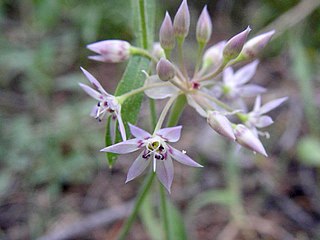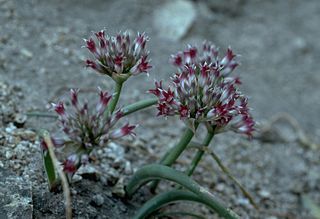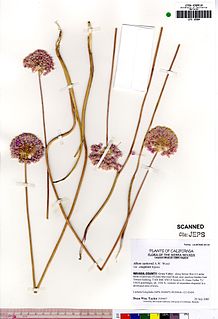
Allium campanulatum is a species of wild onion known by the common name dusky onion or Sierra onion. This is a flowering plant native to the western United States from southeastern Washington and northern Oregon to southern California, and western Nevada. The dusky onion grows in foothills and mountains, especially in dry areas, such as chaparral habitats.

Allium falcifolium is a North American species of wild onion known by the common name scytheleaf onion or coast flatstem onion. It is native to northern California and southern Oregon, where it grows in heavy, rocky soils, especially serpentine soils.

Allium fimbriatum is a species of wild onion known by the common name fringed onion. It is native to California and Baja California.

Allium nevadense is a species of wild onion known by the common name Nevada onion. It is native to the western United States where it grows in sand and rocky soil at elevations of 1400–1700 m. The species is widespread in Utah, Nevada and southern Idaho, and has been reported also from southeastern California, northwestern Arizona, western and central Colorado and eastern Oregon.

Allium tuolumnense is a rare species of wild onion, known by the common name Rawhide Hill onion.
Allium bolanderi is a species of wild onion known by the common name Bolander's onion. It is native to northern California and southwestern Oregon, where it grows in the rocky soils of the Klamath Mountains and surrounding regions.

Allium burlewii is a species of wild onion known by the common name Burlew's onion. It is endemic to California, where grows in the granitic soils of several of the central and southern mountain ranges from Riverside and San Bernardino to Fresno and Monterey Counties, usually between 6,000 and 10,000 feet above sea level.

Allium cratericola is a species of wild onion known by the common name Cascade onion. It is endemic to California, where is an uncommon member of the flora in several of the state's mountain ranges, including the northern and southern California Coast Ranges, the western Transverse Ranges, Klamath Mountains, and the Sierra Nevada foothills. Its range covers much of the state, from Riverside County to Siskiyou County.

Allium denticulatum is a species of wild onion known by the common name toothed wild onion. It is endemic to southern California, where it grows in the western Mojave Desert, the adjacent Tehachapi Mountains, the southern Sierra Nevada, and the Palomar Mountains. It is reported from Kern, San Bernardino, Riverside, Ventura, San Diego Counties.
Allium diabolense, common name serpentine onion or devil's onion is a species of wild onion endemic to central California, where it is known from the Coast Ranges and the Transverse Ranges. It grows on serpentine soils at elevations from 500–1500 m, from Kern and Ventura Counties north to Stanislaus and Santa Clara Counties.

Allium hickmanii is a rare species of wild onion known by the common name Hickman's onion. It is endemic to California, where it is known from Monterey, Sonoma, Kern, and San Luis Obispo Counties.

Allium howellii is a North American species of wild onion known by the common name Howell's onion. It is endemic to California.
Allium membranaceum is an uncommon species of wild onion known by the common name papery onion. It is endemic to California, where it grows in wooded areas in the southernmost Cascade Range, the northern Coast Ranges, and the Sierra Nevada foothills from Tulare County to Humboldt County. It is found on wooded slopes at elevations of 200–1400 m.

Allium monticola is an uncommon species of wild onion known by the common name San Bernardino Mountain onion. It is endemic to southern California, where it is found in the Transverse Ranges and the northernmost section of the Peninsular Ranges. It has been reported from San Bernardino, Los Angeles, Orange, Ventura and Santa Barbara Counties.

Allium munzii is a rare species of wild onion known by the common name Munz's onion.

Allium parishii is an uncommon species of wild onion known by the common name Parish's onion. It is native to the Mojave Desert and Sonoran Deserts of California and Arizona. It grows on open dry, rocky slopes at elevations of 900–1,400 m (3,000–4,600 ft).

Allium praecox is a species of wild onion known by the common name early onion.
Allium punctum is a species of wild onion known by the common name dotted onion or Modoc onion. It is native to the western United States in and around the Modoc Plateau in northeastern California, northwestern Nevada, and southeastern Oregon. It is uncommon, growing volcanic flatlands created by old lava flows.

Allium sanbornii is a North American species of wild onion known by the common name Sanborn's onion. It is native to northern California and southwestern Oregon. It grows in the serpentine soils of the southern Cascade Range and northern Sierra Nevada foothills.

Allium tribracteatum, known by the common name Threebract onion, is a species of wild onion found in California.















